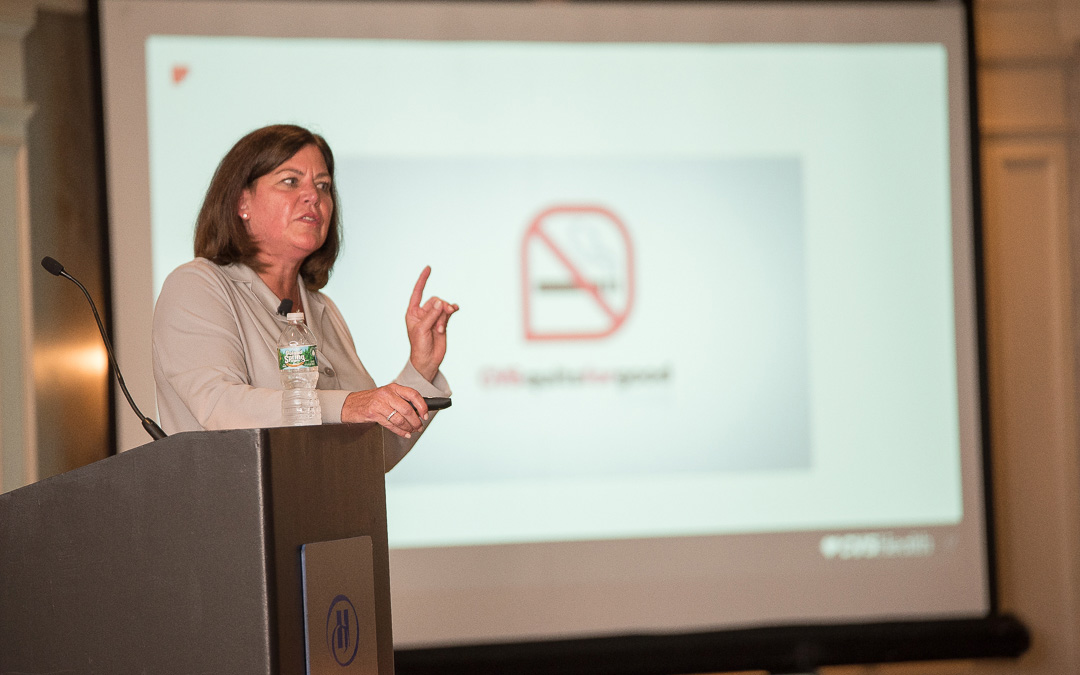
Lisa Bisaccia ’85 MBA, CVS Executive, Discusses Decision to Yank Tobacco from Store Shelves
Selling cigarettes had long been a point of contention for executives at CVS pharmacy, who felt that the sale of tobacco contradicted the company’s mission to promote good health.
But with CVS consumers spending roughly $2 billion a year on cigarettes, other forms of tobacco, and add-on merchandise, the decision to abandon sales was not one that any retailer could make lightly.
“It was getting increasingly hard for us to explain how we could be dispensing life-saving medications in one part of the store and selling tobacco in another,” said Lisa Bisaccia ’85 MBA, executive vice president and chief human resources officer for CVS Health and its 205,000 employees.
“It was a bold decision but it was also part of purposeful leadership,” Bisaccia said. “We asked ourselves ‘What is CVS health?’ We’re not just a drug store. We want to be seen as a health-care company, and selling cigarettes was inconsistent with that goal.”
Bisaccia spoke to more than 300 new graduate students on Thursday evening as part of the UConn School of Business’ Rosenberg-McVay Leadership lecture series at the Hartford Hilton.
Photos from Rosenberg-McVay Business Leadership Series event
featuring Lisa Bisaccia. (Nathan Oldham/UConn School of Business)
Bisaccia referred to her own experience as a UConn graduate student and acknowledged that much has changed over 30 years.
“This is a generation that wants to make a difference, to have a purpose,” she said, noting that millennials—who comprised most of the audience—make up 55 percent of CVS’ workforce. “I know you all want to be part of a company that’s going to have an impact on our country and the world. My challenge to you is can you find a way, in private enterprise, to effect change from the inside out? Apply your business school knowledge to leave a bigger footprint than just yourself.”
If the decision to discontinue the sale of tobacco could have been based strictly upon health concerns, it would have been an easy one, said Bisaccia, who has been with the company for 11 years and spearheaded the communications plan for the elimination of tobacco. As a retail organization, operating on a thin revenue margin, the loss of customers can be devastating, she said. Therefore it was vital that all stakeholders—from suppliers to customers to Wall Street—understood the decision.
In 1965, more than 40 percent of American adults smoked. Now the number is about 18 percent, but it hasn’t changed much in recent years. In addition, some 3 million middle and high school students smoke, she said. Chronic illness accounts for every $3 or $4 spent on healthcare in our country.
“Many chronic illnesses—diabetes, heart failure, COPD –are aggravated by smoking,” she said, noting that almost a half million people in the U.S. die annually from smoking. Smokers die an average of 14 years earlier than non-smokers and nine out of 10 lung cancers are caused by smoking, Bisaccia said. Cigarettes are more addictive than heroin, usually requiring six to seven attempts to quit before success.
“The only way to drop those numbers is to make it either harder to get cigarettes or more socially unacceptable to smoke,” she said. “In January 2014, we made the case to halt tobacco sales in front of our Board of Directors and they said, ‘Can you do it tomorrow?'” recalled Bisaccia, who grew up in Greater Hartford and was the first woman in her family to earn a college degree.
On Feb. 5, 2014 the company formally announced its plans to extinguish tobacco sales and by Sept. 3, 2014, tobacco sales ceased. Instead, CVS concentrated on smoking cessation strategies in its Minute Clinics and the sale of nicotine- replacement products in the area that formerly housed cigarettes.
“We are a purpose-driven organization,” Bisaccia said of the company, headquartered in Woonsocket, R.I. “Our philosophy is ‘Helping people on their path to better health.’ This became our moral compass and every decision is measured by whether it is consistent with our purpose and our strategy.”
CVS has the vast majority of its stores in the U.S. and some 5- to 6- million people visit a CVS store every day. The company employs 28,000 pharmacists and nurse practitioners. Its closest rivals are Walgreens and Rite Aid, both of whom still sell cigarettes. The company has expanded to include managed prescription plans, Minute Clinic, infusion companies, and this year acquired Omnicare, which manages institutional medication. It is also in the process of acquiring Target pharmacies. The company now has more than 7,800 stores and will add 1,600 more when the Target pharmacy merger goes through.
Bisaccia headed the communications campaign for the CVS tobacco-free decision. She made the decision to “go big” with the announcement. Company executives didn’t just want the tobacco to quietly disappear from shelves. They wanted consumers, suppliers, lobbyists and Wall Street to know why the company made the decision. They had to educate their employees about what was happening and how to inform customers.
They thought the decision would get noticed, but were shocked at the reaction.
CVS’ decision was the top television news story on all three networks, garnered newspaper headlines and a flood of social media. Professional organizations from the American Medical Association to the American Cancer Society applauded the decision, as did everyone from President Obama to Bill Gates. In total the company got 218 million media mentions.
“Keep in mind, this was a business decision, not some Kardashian news,” Bisaccia said, to which the audience laughed. The message came through loudly that as a health-care company, this was no longer acceptable. Some customers were angry; some were pleased.
Two weeks later, a Gallup Poll found that 81 percent of respondents were aware of CVS’ decision and 58 percent understood its purpose. More than half realized that this set the company apart from other pharmacy chains and 25 percent said they were more likely to shop in a CVS store. At the same time, CVS changed its name from CVS Caremark to CVS Health.
In Boston and San Francisco, two cities that have banned tobacco sales, there has been a marked decline in tobacco use, she said. At CVS pharmacies, there has been a sharp uptick in people seeking smoking cessation counseling and nicotine replacement. CVS employees who filled out a confidential survey expressed pride in and support for the decision. The company CEO even received roses on Valentine’s Day from a group of nurses who recognized his courage.
While it is too early to measure results, the company hasn’t experienced any large exodus from its pharmacy; the loss of sales was less than expected, and health and beauty supplies now fill the displays that formerly held cigarettes.
“I’m really happy with this decision,” Bisaccia said. “We think it is having a measurable effect on the amount of tobacco that is purchased and used.”
